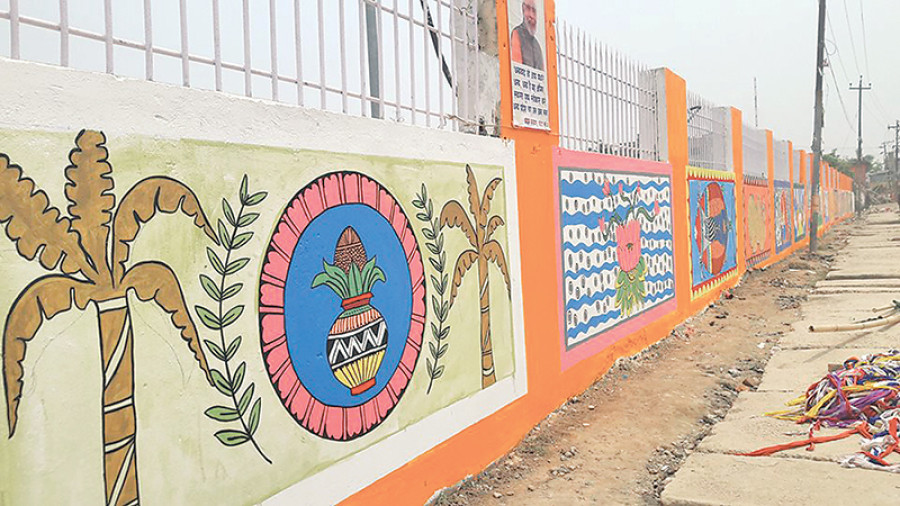Opinion
Have a pleasant stay
Nepali civil society should forget the past and consider the long-term benefits of Modi’s visit
Randhir Chaudhary
Bonhomie is in the air following the news that Indian Prime Minister Narendra Modi will be visiting Nepal on May 11. He will first visit Janakpurdham, and the provincial government is decorating the religious city with saffron, which is also the emblematic colour of Modi’s Bharatiya Janata Party (BJP). Unfortunately, while the government is making frantic preparations to give the Indian prime minister a warm welcome, Nepal’s so-called civil society members are pouring venom on his planned trip.
South Asia has influence at the global level due to the rising economies of China and India. Amid the fast moving global politics, a question arises whether Nepal thinks of its existence or not. Nepal must gain the optimum advantage from Modi’s visit to Nepal. So it is nothing more than ironic that the so-called civil society members are posting messages on social media with the hashtag #BackOffIndia, emphasising that Nepal has not forgotten the pain inflicted by the Modi administration when it imposed an economic blockade immediately after a massive earthquake flattened the country.
Diplomacy is key
All right, they have a right to express their dissatisfaction. At the same time, do they have any alternative except to seek help from India and China to catch up in the economic race in South Asia? If the seasonal Nepali civil society members do not act strategically, there will be a negative impact on Nepal’s development for sure. The bitter relation between India and China is not a secret to anyone. Just last year, the two nearly went to war over a border issue at Doklam. But the Asian giants turned to negotiations, the primary tool of diplomacy, and sorted out their differences. As tensions have relaxed, Chinese President Xi Jinping invited Prime Minister Modi to visit China—which Modi did just recently.
Closer to home, Modi is visiting Nepal for the third time after becoming prime minister when no Indian prime minister had visited the country for the last two decades. Nepal should take advantage of Modi’s visit. Yes, Modi is visiting Nepal with his national interest at the centre. Similarly, Nepal has to keep its national interest at the centre and act accordingly.
Tourism promotion
Janakpurdham, a historical and religious city in Nepal, automatically gets highlighted in the international arena, and the campaign to register its centrepiece Janaki Temple in the Unesco World Heritage List will be provided a fillip. Two, the Ramayan Circuit is the most ambitious project of the Modi government, and Nepal is included in the pilgrimage trail. The Indian government plans to connect all the places where Lord Ram set foot during his 14-year exile in the jungle. After developing the circuit, the concerned and adjoining places will get developed, basically through the promotion of tourism. In this regard, some districts of Nepal will get connected with the circuit as mythology claims that Lord Ram came to Janakpurdham to marry Goddess Sita. Likewise, several railway projects are being constructed with India’s assistance. Nepal should propose to Modi to extend the railway from Patna to Janakpur so that a huge number of tourists will visit Janakpurdham and other religious places. Third, the Postal Highway, which is the lifeline of Tarai-Madhes, must be discussed seriously as India has promised to implement the project.
Concrete steps
In 1990, the then Indian prime minister Chandra Shekhar had pledged to build roads to speed Nepal’s development. Such promises have been repeated during every visit from either side. This time, concrete talks must be held with Modi, and Nepal should also complete the tasks it has promised to do. Fourth, as an open border is both a beauty and challenge for both India and Nepal, Nepal must talk with Modi about border security to avoid illegal and terrorist activities. Prime Minister KP Sharma Oli should also boldly ask Modi to implement all the projects India has agreed to execute.
Nepal-India relations soured after the promulgation of the constitution. Following the completion of the elections and the formation of the left alliance, India has changed its perspective about Nepal and is using ‘soft diplomacy’ which is a good sign for both countries. The Indian Lok Sabha elections slated to be held in 2019 is another reason why Modi is trying to maintain good ties with the neighbours. In conclusion, in the changing global politics which is the ‘politics of economic growth’, Nepal must hold a position. Relations with India could be an elixir for Nepal to have multifaceted help. In such a favourable scenario, the so-called civil society of Nepal must think of the long term and create an environment to welcome the Indian prime minister.
Chaudhary holds a Bachelor of Laws degree




 14.12°C Kathmandu
14.12°C Kathmandu










